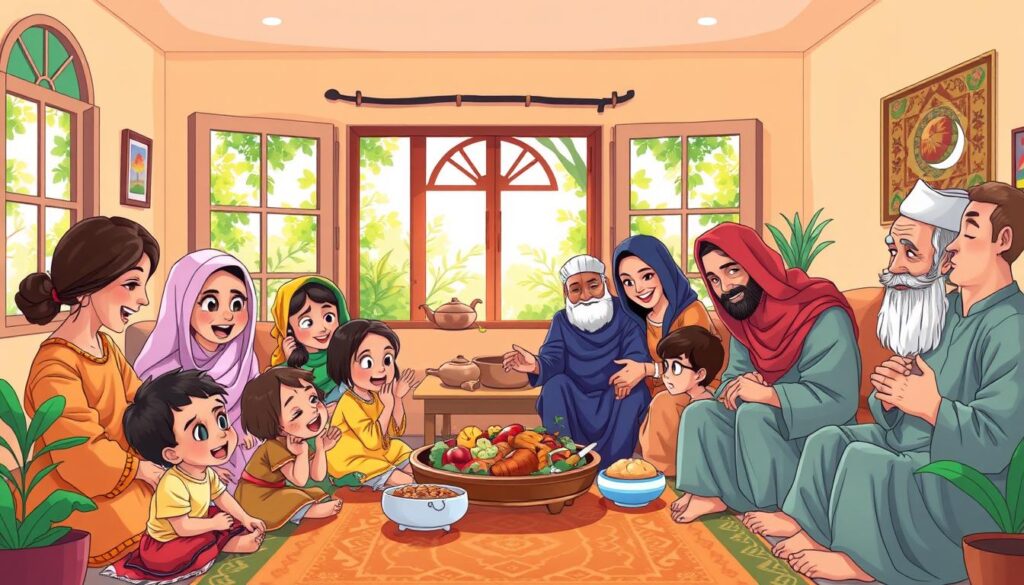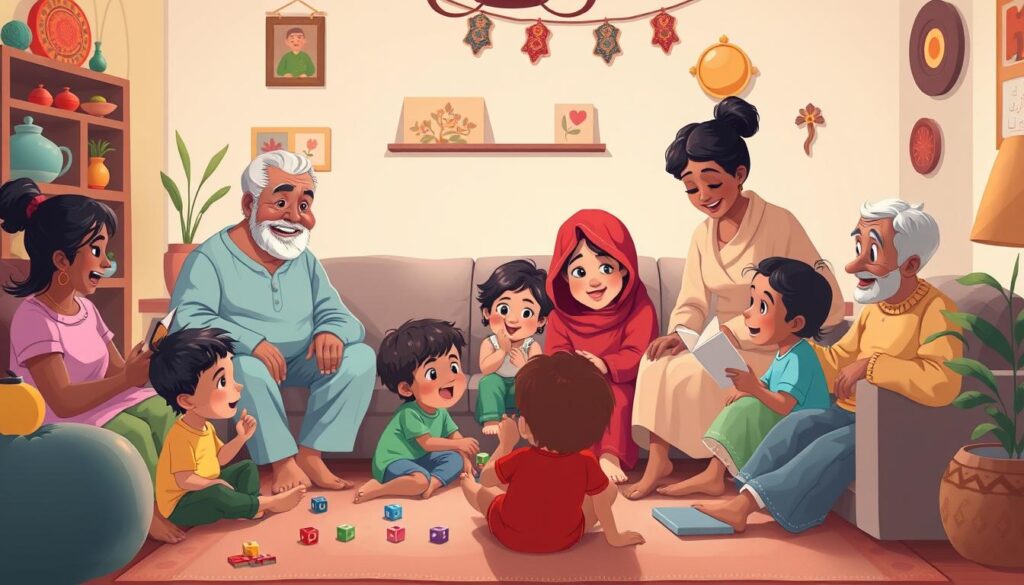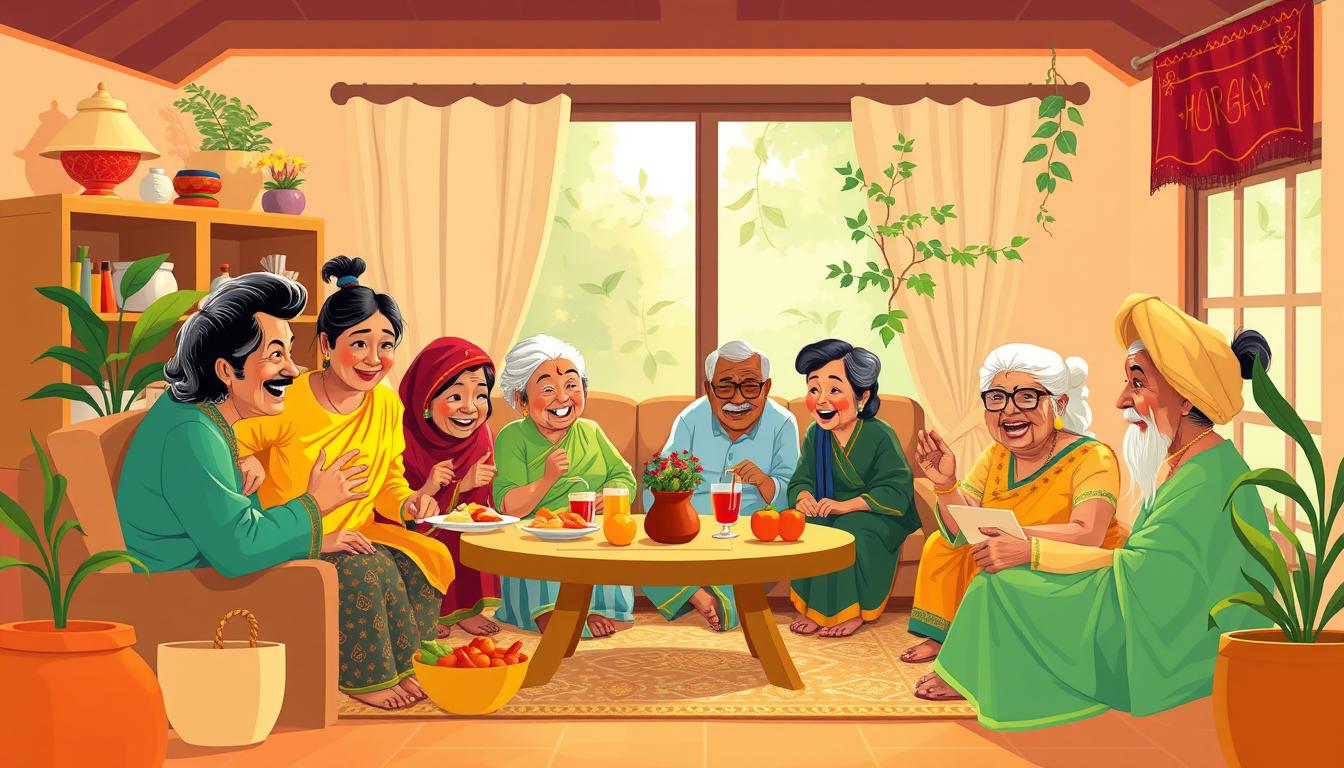We think family is the base of society. The extended family is key in giving emotional support, keeping cultural traditions alive, and building community. Islamic teachings show that 85% of parents believe love and mercy strengthen family ties. This is a big number that shows how important extended family is in Islam.
At Umar Khan Charity Organization, we aim to change lives through faith-based help. We want you to join us in making a big impact. The extended family brings people together, giving them a sense of belonging and identity. It’s vital in making family bonds stronger, and we’ll dive deeper into this in this article.
We’ll talk about the good things about extended family. For example, families that follow Islamic values have 45% fewer fights than others. They also spend 20% more time doing family things. The extended family is key in building a supportive community. We’ll look at how it helps people and society.
Key Takeaways
- The role of extended family is vital in providing emotional support and preserving cultural heritage.
- 85% of Islamic parents believe that values like love and mercy improve family bonds.
- Families following Islamic values experience 45% fewer conflicts compared to others.
- Islamic families spend 20% more time on family activities than others.
- Children raised with Islamic values are 60% more likely to resolve conflicts peacefully with family members.
- The importance of extended family is evident in its contribution to the well-being of individuals and society.
- We, at Umar Khan Charity Organization, are committed to promoting the role of extended family in strengthening family bonds.
Understanding the Concept of Extended Family in Islam
We believe that by working together, we can create a stronger, more supportive community. In Islam, the concept of extended family is deeply rooted in the teachings of the Quran and the Hadith. It emphasizes the importance of maintaining strong family ties, respecting elders, and providing support to one another. A family support system is essential in Islam, and extended family dynamics play a significant role in this system.
Definition and Importance
The extended family system is defined as a system where all members of a clan live together, sharing expenses and responsibilities. This system is considered essential in Islam, as it promotes unity, love, and friendship among family members. The importance of extended family in Islam cannot be overstated, as it provides a sense of belonging and identity for its members.
Cultural Significance
The cultural significance of extended family in Islam is evident in the way it is emphasized in the Quran and the Hadith. The extended family is seen as a source of strength and support, and its members are encouraged to work together to achieve common goals. In Islamic cultures, extended family members often live together, sharing meals and responsibilities, and providing emotional support to one another.
Differences from Nuclear Families
Extended family dynamics differ significantly from nuclear families. In a nuclear family, the focus is on the individual family unit, whereas in an extended family, the focus is on the collective family unit. This difference has significant implications for the way family members interact with each other and the way they provide support to one another. In an extended family, members are more likely to share responsibilities and provide emotional support to one another, creating a stronger and more supportive community.
Historical Perspective on Extended Families in Islam
We learn a lot from our history and culture to make our community stronger and kinder. In Islamic history, extended families were key in shaping society, economy, and culture. They played a big role in Muslim communities.
Looking at the cultural significance of extended family shows us its value. Extended families help keep cultural heritage alive and offer emotional support. In traditional Muslim families, many generations live together. This gives everyone security and support when needed.
The benefits of extended family are many. They include:
- Keeping cultural traditions and heritage alive
- Providing emotional support and a sense of belonging
- Creating chances for shared learning and experiences
Reflecting on extended families in Islam’s history teaches us about the importance of family bonds. It also shows us how to keep our cultural heritage alive. This way, we build a community that values and supports extended families.

Spiritual Dimensions of Extended Family Relationships
Extended family plays a big role in making us feel connected and who we are. Islamic teachings stress the importance of helping each other, showing respect, and working together. These values help us build a community that values faith, family, and helping others.
Creating this community means looking at the spiritual side of family ties. We need to understand how family members relate to each other over time. Tools like the genogram help us see this by looking at at least three generations. This way, we can tackle issues passed down through generations.
Key steps to nurture the spiritual side of family ties include:
- Encouraging religious values and practices
- Fostering a sense of unity and cooperation
- Providing emotional support and stability
By focusing on these steps, we can make our family bonds stronger. This strengthens our sense of belonging and identity. It also helps us grow and thrive together as a community.
The Impact of Extended Family on Children’s Upbringing
Extended family can greatly shape our children’s lives. It helps them grow into caring and responsible people. Studies show that extended family support is good for kids. It gives them role models, mentors, and a feeling of belonging.
In our family support system, extended family is key. It offers emotional support and keeps cultural traditions alive. The benefits of extended family in children’s lives include:
- Increased likelihood of completing their education
- Decreased likelihood of experiencing depressive symptoms
- Improved cognitive and social abilities through interaction with grandparents
- Development of essential social skills such as communication, sharing, cooperation, and empathy
Family gatherings and traditions help kids feel proud and connected. They learn about their culture and feel part of a community. This builds their emotional security and sense of belonging.

We must value extended family in raising our children. By being caregivers and guides, we give them the support and love they need. This helps them thrive.
| Benefits of Extended Family Involvement | Positive Outcomes |
|---|---|
| Emotional Support | Increased sense of belonging and security |
| Mentorship | Improved cognitive and social abilities |
| Cultural Heritage | Enhanced cultural identity and pride |
Social Benefits of Extended Family Networks
Extended family networks are key to building a strong community. They offer emotional support and stability, which are vital for our well-being. These networks make our communities more resilient and supportive.
In many cultures, extended families are the norm. They act as social safety nets, providing emotional and financial support. For example, a Pew Research center report showed a rise in multi-generational households in the U.S. during the 2007-2010 recession.
Emotional Support and Stability
Extended family networks offer emotional support and stability. This is critical in times of crisis. They help build resilience in families.
By embracing extended family benefits, we aim for a more harmonious society. As we strengthen our relationships within these networks, we create a sense of belonging. This improves our well-being and quality of life.
Building Resilience in Families
Extended family networks help families build resilience in several ways:
- Providing emotional support and stability
- Offering financial assistance and resources
- Fostering a sense of belonging and community
By valuing extended family networks, we aim for a more supportive community. Emphasizing their benefits and cultural significance helps us build stronger, more harmonious relationships.
Challenges Faced by Extended Families Today
Extended families today face many challenges. They need support and guidance to overcome these hurdles. The role of extended family is key in giving emotional support and keeping cultural heritage alive.
Extended families today struggle to balance old traditions with new ways. They also deal with being spread out and finding ways to resolve conflicts.
The role of extended family is very important. In the U.S., 55% of adults live close to their extended family. This closeness helps build a sense of community and belonging, which is good for our emotional and social health.
Some of the challenges extended families face include:
- Being spread out, making it hard to stay close
- Dealing with conflicts and finding ways to resolve them
- Trying to balance old traditions with modern life
Despite these challenges, the value of extended family is clear. We must work together to strengthen our family bonds. By supporting each other, we can build a stronger, more resilient community ready to face today’s world.
The Role of Extended Family in Times of Crisis
Extended family is key in supporting each other during tough times. In Islam, they offer emotional and financial help. They share wisdom and help strengthen family bonds through hard times.
A strong family support system is vital for overcoming challenges. Extended family gives a sense of belonging and identity. This is very important during crises. Here are some ways they can help:
- Emotional support: being there and listening
- Financial support: helping out with money when needed
- Shared wisdom and experience: giving advice based on their lives
Having a solid family support system makes facing life’s hurdles easier. By building and keeping our extended family ties, we create a network of love and care. This support benefits everyone involved.
Promoting Strong Relationships within Extended Families
We know how vital strong ties within extended families are. They help build a supportive community. The role of extended family in shaping our identities and values is huge.
Studies show that grandkids feel more secure and connected when they have a good bond with their grandparents. Grandparents share cultural values and wisdom with the next generation. Aunts and uncles offer support and guidance, making the family even stronger.
To strengthen these bonds, we can:
- Have regular family reunions and gatherings
- Use effective communication strategies
- Share activities and traditions
By focusing on these, we can build a sense of belonging and identity. This leads to stronger, more supportive family ties. Embracing our extended family’s cultural significance helps create a loving community.
| Benefits of Extended Family | Description |
|---|---|
| Emotional Support | Extended family members offer emotional support and comfort in tough times. |
| Cultural Significance | Extended family is key in keeping cultural heritage and traditions alive. |
| Shared Activities | Sharing activities and traditions helps create a sense of belonging and identity. |
Conclusion: The Lasting Influence of Extended Families in Islam
Extended families in Islam play a big role in our communities. They teach us about compassion, unity, and working together. These values are key to our families and communities.
By building strong family bonds, we make sure these values last for many years. This is important for our families and communities.
The role of extended family is more than just tradition. It shows our deep faith. Extended families offer emotional support and keep our culture alive.
They are the heart of Islamic society. By following this model, we can create a stronger and more united community. We celebrate our family ties and learn from our elders.
Let’s work to strengthen our family bonds. We can do this through regular meetings, talking openly, and sharing activities. This way, we honor our past and build a brighter future.






